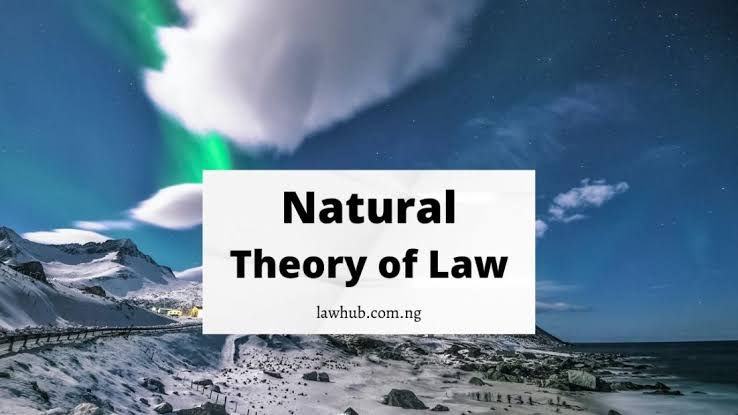Natural Theory of Law
Natural law is a broad and often misapplied term.
It goes around various schools of thought in different disciplines like Philosophy, Science, Law, etc.
In the light of this fact, it is therefore crucial that a clear understanding about the subject-matter be gotten.
This includes the understanding of the keywords, ‘natural’ and ‘law’. So, this post is on the Natural theory of Law.
Meaning of ‘Natural’ in Natural Law
The first word ‘natural’ (adj.) comes from the root word nature (noun).
We may define Nature as the innate characteristics of a thing, among other various definitions.
However, the definition of the second word, ‘law’, is a question that has agitated the minds of scholars and intellectuals over the years.
This is because the word is all-embracing in scope and dimension.
To read my blog post on the definitions and explanation of Law, click the link.
From my own view, which I submit and propose to be generally accepted, “a law is an expression, indicator or imposer of a consistent reality; proven or hypothetical, sanctioned or unsanctioned, true or mythical, harmonious or antagonistic.”
See also: Positive Theory of Law (Legal Positivism)
As you should have noticed, this is a wide view approach. Nevertheless, as regards this subject matter, Law is taken as “an expression and indicator of a reality, sanctioned and enforced by a person, persons, body or institution.
From the foregoing, natural law theory is a legal theory that recognises law and morality with deep connections, if not one and the same.
Morality relates to what is right or wrong, good or bad, acceptable or unacceptable, permissible or impermissible.
NATURAL THEORY OF LAW: SIMPLIFIED MEANING
Natural law is a school of thought asserting that certain rights are inherent by virtue of human nature.
Endorsed by nature, traditionally by God or a transcendent source.
And that we can explain this universally through human reason.
Simply, Natural Law theorists, unlike promulgators of positive law, believe that we define human laws by morality, and not by an authority figure.
Therefore, their human nature guide humans to figure out what their laws should be, and to act in conformity with those laws.
See also: Differences between Natural and Positive Theory of Law
Reduced to its simplest form, natural law means what is ‘fair’, ‘right’, or ‘just’. The protagonists of this theory of law include Zeno, Plato, Aristotle, Socrates, Thomas Aquinas, Grotius, and others.
They hold the primary view that there are certain objective principles in everyman, no matter his colour, race or tribe, that tells him what action or any form of act is right, fair and just.
These principles motivate him to do what is good and abstain from what is evil.
Words of Prof. Okuniga: Natural Theory of Law.
Professor Okuniga said in his own illustration. “If ten men from different countries are put in separate rooms, and each of them is asked in the language that he understands, whether it is good tom steal, majority will say no.”
In a nut shell, Natural law refers to the principles inherent to man, which tells him what is fair, good, impartial, right and just.
These principles should serve as the bases for the making of real life laws and orders. Any law made by anybody that is not in accordance to these intrinsic principles is not valid.
I once held_ “The discovery of the positive law is not a shift from the use of the natural law, rather, it is a designed, regular, and enforced reproduction of it.
The reason for positive law is merely to justify the application of natural law.
Hence, when we convict a man, we say to ourselves, “we have done justice,” apparently to satisfy our innate principles, natural law.
See also: Meaning of Prayer and summon in Law: & Motion
Natural law, since its emergence, has bred some major advantages above other schools of thought. Some of these advantages include:
Advantages of the Natural Theory of Law
- The development of the concept of equity, human rights, and democracy across the globe.
- It is based on reasoning, and not revelation – this allows making it possible for everyone to follow the principles.
- It is universal and absolutist; so it is always relevant.
- It allows for a clear cut approach to morality and establishes common rules.
- The Americans invoked it in their war of independence, as well as the French, during the French revolution.
Disadvantages of the Natural Law Theory
However, Natural Theory of Law has its own undeniable disadvantages, and some of these are heighted below:
- It is not always a simple school of thought. The determination of what is right and what is sometimes as hard as anything.
- Natural law philosophy stresses ‘what ought to be done’ and not necessarily ‘what is done.’
- The theory is based solely on right reasoning, which is a criterion that cannot be verified through empirical scrutiny.
- There is what we call ‘the multiple-conscience problem.’ That is to say, different individuals have different explanations for, and determinations of, what is right and what is wrong. As regards this problem, we call the Natural Theory of Law ‘a harlot.’
REFRENCES
1. Introduction to Nigerian Legal Method, edited by Abiola Sanni.
2. WEB: Study.com, Wikipedia, allaboutphilosophy.org
3. English dictionaries, Synonym Antonym Learner {app}
4. Wikipedia


Leave a Reply